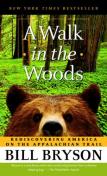BKMT READING GUIDES
A Walk in the Woods (Movie Tie-In): Rediscovering America on the Appalachian Trail
by Bill Bryson
Mass Market Paperback : 397 pages
70 clubs reading this now
32 members have read this book
Introduction
The Appalachian Trail trail stretches from Georgia to Maine and covers some of the most breathtaking terrain in America?majestic mountains, silent forests, sparking lakes. If you?re going to take a hike, it's probably the place to go. And Bill Bryson is surely the most entertaing guide you?ll find. He introduces us to the history and ecology of the trail and to some of the other hardy (or just foolhardy) folks he meets along the way?and a couple of bears. Already a classic, A Walk in the Woods will make you long for the great outdoors (or at least a comfortable chair to sit and read in).
Your initial reaction to Bill Bryson's reading of A Walk in the Woods may well be "Egads! What a bore!" But by sentence three or four, his clearly articulated, slightly adenoidal, British/American-accented speech pattern begins to grow on you and becomes quite engaging. You immediately get a hint of the humor that lies ahead, such as one of the innumerable reasons he longed to walk as many of the 2,100 miles of the Appalachian Trail as he could. "It would get me fit after years of waddlesome sloth" is delivered with glorious deadpan flair. By the time our storyteller recounts his trip to the Dartmouth Co-op, suffering serious sticker shock over equipment prices, you'll be hooked.
When Bryson speaks for the many Americans he encounters along the way--in various shops, restaurants, airports, and along the trail--he launches into his American accent, which is whiny and full of hard r's. And his southern intonations are a hoot. He's even got a special voice used exclusively when speaking for his somewhat surprising trail partner, Katz. In the 25 years since their school days together, Katz has put on quite a bit of weight. In fact, "he brought to mind Orson Welles after a very bad night. He was limping a little and breathing harder than one ought to after a walk of 20 yards." Katz often speaks in monosyllables, and Bryson brings his limited vocabulary humorously to life. One of Katz's more memorable utterings is "flung," as in flung most of his provisions over the cliff because they were too heavy to carry any farther.
The author has thoroughly researched the history and the making of the Appalachian Trail. Bryson describes the destruction of many parts of the forest and warns of the continuing perils (both natural and man-made) the Trail faces. He speaks of the natural beauty and splendor as he and Katz pass through, and he recalls clearly the serious dangers the two face during their time together on the trail. So, A Walk in the Woods is not simply an out-of-shape, middle-aged man's desire to prove that he can still accomplish a major physical task; it's also a plea for the conservation of America's last wilderness. Bryson's telling is a knee-slapping, laugh-out-loud funny trek through the woods, with a touch of science and history thrown in for good measure. (Running time: 360 minutes, four cassettes) --Colleen Preston
Discussion Questions
1. One of the most interesting aspects of this book is the unlikely friendship between Bryson and Katz. What is the relationship based on? Consider, especially, the episode in Maine when Katz gets lost: somehow the friendship is altered. How does Bryson's attitude toward Katz change over the course of the book? How does Katz himself change? Or does he? What was Katz's motivation, anyway, to walk the AT?2. The book offers an excellent microscope through which to examine the meaning of friendship—our own friendships. Do the two men remind you of friends who tested your patience, but who exhibited intense loyalty?
3. In fiction a journey usually symbolizes a journey of self-discovery—at the end the protagonist comes to learn something about him/herself. Although A Walk isn't a novel, do either of the men come to greater self-awareness by the end of their journey?
4. The tone of the book veers back and forth between humor and seriousness, even anger. In fact, the book is a sort of jeremiad against environmental threats to the great wilderness areas of the country. Is Bryson's anger justified? He criticizes, but does he offer solutions? Are there solutions?
5. Katz pokes fun at rural Southerners, which some readers find funny, others find offensive. You?
6. Bryson ponders the attraction of hiking: ''You have no engagements, commitments, obligations, or duties; no special ambitions and only the smallest, least complicated of wants; you exist in a tranquil tedium, serenely beyond the reach of exasperation." If you're a hiker, backpacker, camper, are your experiences similar to or different from Bryson's? For those who aren't hikers, are there other avenues to "exist in a tranquil tedium"?
7. You might also talk about the numerous characters Bryson and Katz meet on the trail. Mary Ellen is one, for instance: how do you feel about their treatment of her? (from Litlovers)
Suggested by Members
Book Club Recommendations
Recommended to book clubs by 0 of 0 members.
Book Club HQ to over 90,000+ book clubs and ready to welcome yours.
Get free weekly updates on top club picks, book giveaways, author events and more








